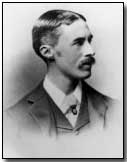Prose & Poetry - Alfred Edward Housman
 Alfred Edward
Housman (1859-1936) was born in Bromsgrove on 26 March 1859, the eldest of
seven children.
Alfred Edward
Housman (1859-1936) was born in Bromsgrove on 26 March 1859, the eldest of
seven children.
After Bromsgrove School he won a scholarship to St. John's College, Oxford, in 1877. Despite gaining a First Class Honours in Classical Moderations Housman failed his Greats and so left Oxford without a degree in 1881.
After leaving Oxford he spent a time teaching at his old school before taking and successfully gaining a pass degree at Oxford. He subsequently took up employment at the London Patent Office.
On the strength of articles published in various classical journals, Housman was appointed Professor of Latin at University College London in 1892 where he remained until 1911. He published what was to become his most famous work, A Shropshire Lad, in 1896, at his own expense after several publishers turned it down. It gained in popularity during the First World War.
In 1911 Housman became Kennedy Professor of Latin at Cambridge; he spent the rest of his life as a Fellow at Trinity College. In 1922 he published a second volume of verse, Last Poems, followed posthumously by More Poems and Additional Poems.
During the First World War Housman published several poems about the conflict including Epitaph on an Army of Mercenaries (1914), written after the First Battle of Ypres.
Alfred Edward Housman died on 30 April 1936.
Epitaph on Army of Mercenaries (1914)
These, in the days when heaven was falling,
The hour when earth's foundations fled,
Followed their mercenary calling
And took their wages and are dead.Their shoulders held the sky suspended;
They stood, and the earth's foundations stay;
When God abandoned, these defended,
And saved the sum of things for pay.
Download "A Shropshire Lad" (Project Gutenberg Text)
German losses at Messines were 25,000, of which 7,500 were taken prisoner. British casualties were 17,000 killed or wounded.
- Did you know?
